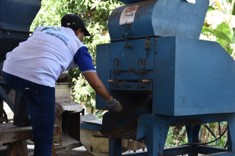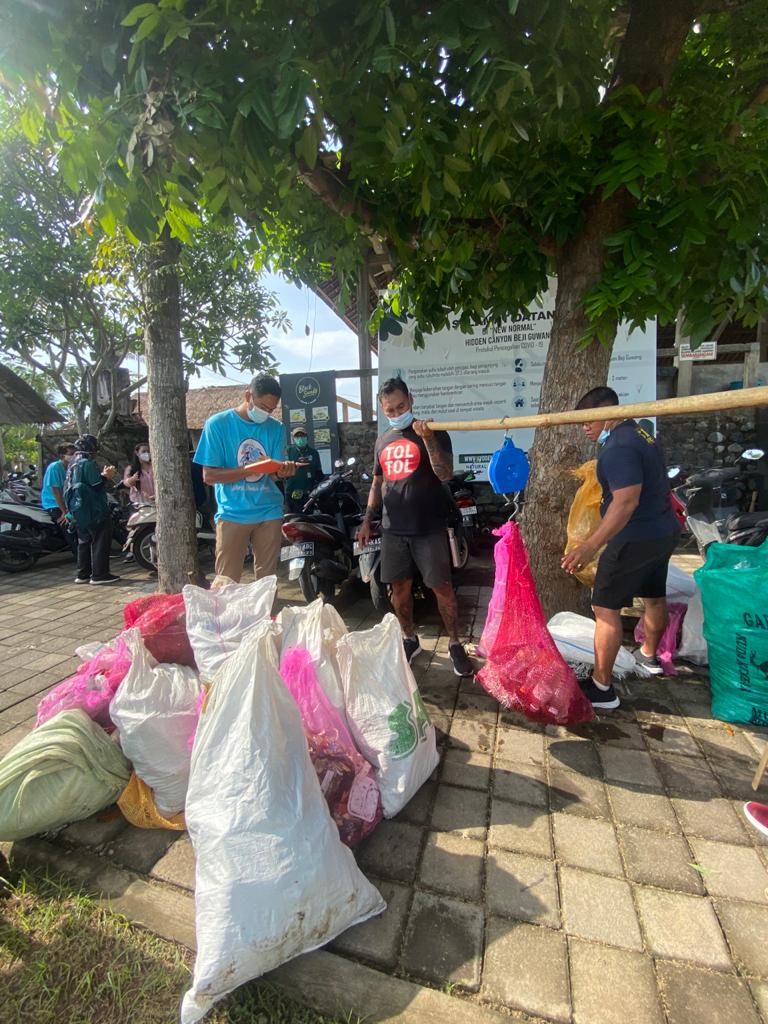Innovative Solution to Combat Marine Litter - Reduce, Reuse, Recycle (3Rs) Result
- Waste Bank
The main source of national waste generation comes from household activities, which is 36% from total waste generated. The waste management approach must also be based on community participation, therefore building waste bank facilities is important to raise public awareness in applying the 3Rs principle (reduce, reuse, recycle). In so doing, the community could be encourage to sort and process their waste independently.
The waste bank facilities have been operated in 31 provinces and 218 districts / cities with 8036 plants in total all across Indonesia. Waste banks have positive impact for the environment, social, and economy. In addition to reducing the number of waste piled up in landfills or drifted in the environment, there are also job opportunities and new sources of income from doing this initiative.


Source Picture: Fahmi Hidayat
- Waste Management Facility-3Rs Recycling Center
Waste management facility with 3Rs principle reduce, reuse, recycle (TPS-3R) are centres for carrying out activities of collecting, sorting, reusing, and recycling at a regional scale. As a Recycling Centre (PDU) facility, TPS-3R provides circular economic benefits and enhances the welfare of the community through household waste management activities. At the moment, the Ministry of Environment and Forestry has built PDUs in 11 districts / cities and in 2019 plans to build PDUs in 7 other districts / cities. Based on data provided by the Ministry of Public of Work and Housing, from 2008 to 2018, 1,052 PDU units has been built throughout Indonesia.

Recycling center
- Creative Recycled Products
The recycling process begins by shredding and decomposing items into its basic material and forming it into another item, often into a material of lower quality than the initial item. Upcycling, on the other hand, is the process of transforming unused items into something more useful and valuable than the previous item.
Upcycling is identical to the process of recycling inorganic goods such as plastic bottles or glass, cans, cardboard, cloth, tires, beverage-packaging boxes, detergent packs, or other food wrappers. The purpose of this concept is to prevent wasting materials by optimizing existing ones.


Recycled Plastic Carnival
- Plastic Bottle-Paid Bus
Suroboyo Bus is a bus rapid transit service in the city of Surabaya which fares paid using plastic waste. This bus can carry as many as 67 people at maximum. The plastic waste collected will then be deposited to the Waste Bank to be recycled into more useful materials.
Suroboyo Bus is a bus rapid transit service in the city of Surabaya which fares paid using plastic waste. This bus can carry as many as 67 people at maximum. The plastic waste collected will then be deposited to the Waste Bank to be recycled into more useful materials.


Bus Suroboyo : plastic Bottle - Paid Bus
- City Initiatives to Limit the Use of Plastic Bags
Since June 1st, 2016, the city of Banjarmasin has begun to ban plastic bags in modern retailers and became the first city in Indonesia to implement such policy. Until now, regency / city governments that have a plastic bag prohibition policy in place including :
- Provinsi Bali 8. Kota Denpasar
- Kota Banjarmasin 9. Kota Bukittinggi
- Kota Balikpapan 10. Kota Samarinda
- Kota Banjarbaru 11. Kota Jayapura
- Kota Bogor 12. Kota Bontang
- Kota Padang 13. Kabupaten Badung
- Kota Jambi 14. kota Biak


Single Used Plastic Prohibition
- Waste to Energy
Benowo Landfill, Benowo landfill receives and processes waste from the city of Surabaya with volume of up to 1,500 tons per day on an area of 37.4 hectares with the largest proportion (57-60%) of this waste is organic. This landfill serves 3 million people in Surabaya and could provide up to 2 MW of electricity from processed methane and 7 MW of Electricity from its gasification process (Thermal Process). PT. Sumber Organik holds a 20-year concession to manage Benowo Landfill as a result of an agreement with Surabaya City Government.


Benowo Landfill Gas - Fired Power Plant
Diesel-powered Electricity Generator (DEG) Gasifier is an innovation among other waste-to-energy inventions. This DEG is using waste as a complementary materials for coal-fired power generator, by using pellets made from organic waste collected from surrounding communities. Worth selling garbage like plastic bottles will be collected for sale, whereas plastic waste, food, and dried leaves will be processed into pellets.
The pellets are artificial 'coal' from the mixture of organic and inorganic waste that has gone through the process of crystallization or fermentation. In Bali, many villages have produced this pellet, one of them is located in Gunaksa in Dawan District, Klungkung which is a village empowered by PT Indonesia Power (IP).


Gasifier PLTD Pesanggaran Bali Arrtificial Coal Pellets
TOSS (Local Waste Processing Site)
TOSS is a waste management facility to process waste into alternative energy. The TOSS program is the product of collaboration between the College of Engineering (STT)-PLN Jakarta and PT Indonesia Power. The method used in the TOSS program is to process waste into pellets and briquettes as a renewable energy source. This TOSS program also often visited by local Balinese institutions, as well as national and international levels.

TOSS ( Local Waste Processing Site)

